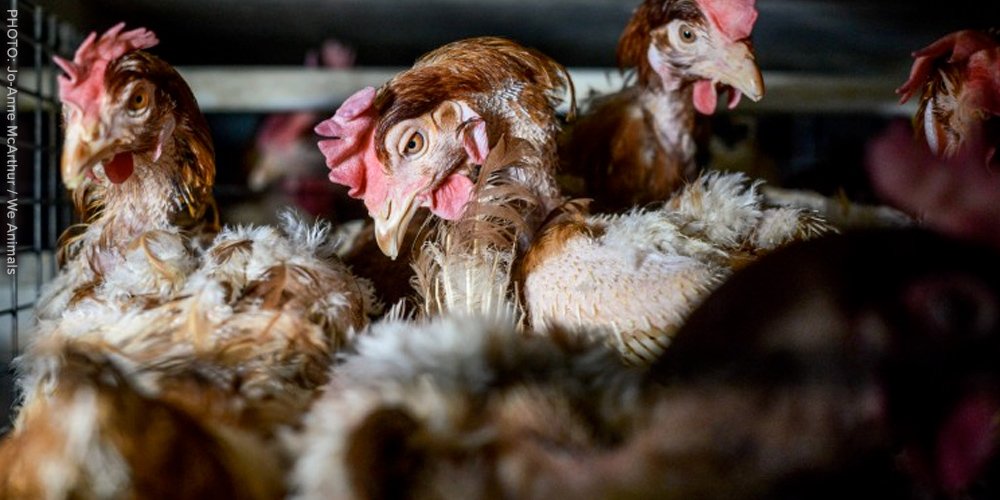Learning to live a normal life – Perching.
Battery hens have lived in an artificial environment their whole lives, so this means no access to natural light. The normal routine of a hen to ‘roost’ (to return to a safe place to rest at night), may take a little getting used to for hens who have never seen night or day.
- Hens will naturally prefer to sleep on the highest point possible — this is called ‘perching’ and in the wild, this behaviour keeps them protected from predators.
- Initially, ex-battery hens may not be used to this concept, and if they have damaged feet it will make this more of a challenge.
- For these reasons, it’s important to provide the hens with an easily-accessible nesting box, and note that they will likely want to sleep together for comfort.
- Ensure you check their nesting box/es daily to keep them clean and dry.
Making new friends!
Ex-battery hens will have never seen or smelled another animal in their lives. If you have pets at home, particularly those that a hen might see as a predator, such as a cat or dog — it’s vital that you allow the animals to get used to each other slowly, and monitor them together.
Even if you are certain that your animal is safe around chickens, remember that the hens have lived in a cage for their entire lives and may be very nervous to begin with, and can even go into shock.
Adjustment period.
Hens from factory farms have lived in an environment where the temperature, light and even air is controlled They have had no stimulation, no ability to exercise or express their natural behaviours. You will find that hens will need little help as far as ‘learning’ to be a chicken — they will embrace a new life of freedom and enrichment as if they’ve been waiting for it their whole lives (indeed, they have.)
However, after years in such a sterile environment, it’s important to keep in mind that there is a lot for them to take in. At first, even the sight of an open field might be frightening and they will need time to adjust to their new lives. For this reason, it’s important that you be patient with them:
- allow them time to slowly adjust to their chicken coop, provide them nesting boxes to rest in, and plenty of food, water, and shade.
- Once they are settled and more comfortable, you can gradually allow them to explore their new environment.
Ongoing medical care.
Rescued battery hens should be treated for worms, parasites and coccidiosis. It’s important to note also that the severe living conditions imposed upon battery hens, coupled with their unnatural egg production inflicts a heavy toll upon them — some moreso than others — with few ever expected to live as long as their non-factory farmed cousins.
At the first signs of ill health it is important to be prepared to act; either personally or if you do not have the experience, by consulting your veterinarian. The most common issues to plague ex-battery hens are those that involve their reproductive organs due to excessive egg laying. Other common conditions include respiratory problems and brittle bones.
Your hens may have long toenails, which should wear down over time once they have the opportunity to scratch about. They can be very carefully trimmed with dog toe nail clippers, although only remove a little bit as taking too much length off will cause the nail to bleed.
Due to the stressful environment of a battery cage, your hens may be missing some or nearly all of their feathers when you bring them home. Whilst a ‘naked’ hen is not necessarily an unwell hen, she will require some extra care to ensure she does not suffer as a result. It is advisable to keep featherless hens indoors at first, particularly during times of extreme temperature, whilst they adjust to life outside the cage and begin to regrow their feathers.
Appropriate housing.
A safe night house with a nice, soft floor covering will assist in rehabilitation. A straw bed is great. Please ensure that the environment is kept clean (daily cleaning is a must) and safe.
Remember, rescued battery hens have spent their entire lives trapped within small wire cages, devoid of the very things that make a chicken’s life complete. In adopting a hen, it is important to ensure you are able to provide them with a life truly worth living, which includes:
- enough space for hens to move around freely, privacy to lay their eggs
- safety from predators
- access to the outdoors to scratch in the soil,
- dustbathe and enjoy the sunshine, protection from the elements and last, but never least –
- lots of love and kindness.











